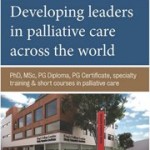Humanizing Medicine
The following initiatives were supported

Clinical Academic Forum of Palliative Care
King’s College London, Northern Region Health Administration, Portuguese Association of Palliative Care, 2014-2015
The Clinical Academic Forum of Palliative Care was established in 2014 in the North region of Portugal to promote and facilitate collaboration between researchers and clinicians and develop a shared vision of the future development of palliative care.
With a total of 140 participants, the Forum organises three meetings a year with presentations from the coordinators of postgraduate courses in palliative care, PhD and MSc students, clinicians and researchers reporting on the latest research advances in the region. There is also place for group discussions to identify research barriers and opportunities locally.

Project “NÓS”
Institute of Bioétics, Catholic University of OPorto, 2014
NÓS project aims to promote better communication and appropriate decision-making by healthcare professionals, namely at the end of life conditions.

Project “SALUTAR”
Centre of Bioethics, University of Lisbon Medical School, 2014
SALUTAR project aims to study the process of grief in a population of family caregivers and patients in palliative care and evaluate, in an 18 months period, its impact at the physical, mental and socioeconomic levels.

Palliative Home Care Units
Funding of six palliative home care units, in rural and urban areas, in the north (5) and south (1) of Portugal, and their operation throughout a three-year period to guarantee the sustainability and later integration into the national Network of Continuous Care.

Gulbenkian MSc and PhD Scholarships for Palliative Care
Cicely Saunders Institute/King’s College London, 2010-2015
The Calouste Gulbenkian Foundation established an academic training programme in Palliative Care in partnership with King´s College London / the Cicely Saunders Institute and including master´s and doctoral degree grants as well as associated research programs. The aims established for this five-year partnership includes qualifying professionals in evaluating models, practices, costs, qualities and choices across the scope of Palliative Care similar to other countries where university centres of reflection and theoretical production are being set up together the fields of medicine, economics and sociology.

Epidemiological Study of Place of Death in Portugal in 2010 and Comparison with the Preferences of the Portuguese Population
This report, released in the World Hospice & Palliative Care Day (12 October 2013), calls for urgent national action to reduce the gap between population preferences and reality for place of death in Portugal.

The Gulbenkian Palliative Care Chair
Faculdade de Medicina, Universidade de Lisboa, 2011-2013
The Calouste Gulbenkian Foundation has given its support to the creation of a Chair in Palliative Care at the Faculty of Medicine of the University of Lisbon. The Chair is intended to promote the development of academic, training and research programmes within the scope of Palliative care. Professor Peter Lawlor, from the University of Ottawa, is the first recipient of the Gulbenkian Palliative Care Chair.

Advance Course in Chronic Pain in Portuguese Oncology Institutes
The expansion of palliative care centres, especially on the home care model, has increased the demand for chronic pain treatment. As a result of this shortcoming in skills, and with the support of project partner entities, the National network of Integrated Continuous Care and the Portuguese Oncology Institute of Lisbon, the Foundation has contributed to the development of a national three year program enabling the training of around a thousand healthcare professionals in chronic pain treatment.

Now and at the Time of our Death
Book by Susana Moreira Marques, October 2012
Symposia on Palliative Care, 2010
In partnership with the JB Fernandes memorial Trust I (Rockefeller Philanthropy Advisors), two symposia on Palliative Care were staged, one in Lisbon and another in Beja. Each symposia featured three conferences and an equal number of workshops: pain management, palliative care in oncology patients and, communicating “bad news”. The guest speakers were: Marcos Montagini (VA Ann Arbor, Michigan), Thomas Smith (Palliative Care Center, Virginia) and Lidia Schapira (Massachissetts General Hospital, Boston.
